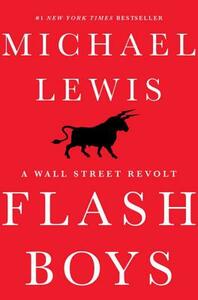Take a photo of a barcode or cover
Michael Lewis has a way of making complex info much more consumable. This is a book that can’t be skimmed, as this particular topic is more dense and technical than something like Moneyball, but in listening to it I was both informed and entertained.
When the stock market went digital, it was ripe for exploitation. This is the story of those who sussed out the problem, found the source and endeavored to make it fair for every investor. I appreciated the multifaceted nature of the tale -- sleuthing, software optimization, engineering challenges, and game theory.
challenging
informative
inspiring
medium-paced
challenging
informative
fast-paced
Informative, angering at times. Michael Lewis generally is good at explaining complex topics, but occasionally still I wasn't sure I totally understood the details. Definitely insightfull, sheds light on how stacked investing is against the little guys
Great story and way of explaining what was going on. The worst part of the book is you are listening to how wall street is screwing all of us regular folks and thinking, I can't wait to see how the SEC fixes this and shuts down the HFTs; only to continue listening and coming to the conclusion that it doesn't get fixed. So it's great to learn how I'm getting screwed, but not learning that it's not going to get fixed.
I picked this up after Lewis was the guest on The Daily Show the day I was in the audience. This is definitely something I wouldn’t have picked up on my own, but he managed to make what could have been a very dry and confusing topic interesting and compelling.
An interesting subject and I enjoyed learning about something I had previously no knowledge on, but not enough time was given between the new exchange being started and the book being written. Lewis summarizes the findings from the group that creates this new, fair exchange, tells the story of them creating it, and then nothing. The book ends. Is IEX successful? Is there any lobbying to change the antiquated rules?
The other thing I struggle with is this is a millionaire/billionaire problem. If someone wants to sell 100k shares, I don't feel much empathy that they need to pay 1 cent more than they would with a fairer system.
The other thing I struggle with is this is a millionaire/billionaire problem. If someone wants to sell 100k shares, I don't feel much empathy that they need to pay 1 cent more than they would with a fairer system.
As many others have commented in reviews, this book is entertaining, but not near the level of "Liar's Poker" or "Moneyball." However, I would also say that it was more informative than I expected it to be. I think of myself as knowing a reasonable amount about high frequency trading (and have even talked with a guy from a HFT firm about it), but I definitely learned some new things from this book.
I also agree with many other reviews that Lewis tries a bit too hard to push the "hurting the little guy" angle, when it is far from clear (to me at least) that HFT in fact does that. The most significant impact of HFT is on large block trades, which are not normally relevant to retail investors. My mental model is that HFT has mostly taken profits away from other financial sector players rather than retail investors.
The (supporting) character of Sergey Aleynikov is a very interesting one. Almost worth reading for his story alone.
I also agree with many other reviews that Lewis tries a bit too hard to push the "hurting the little guy" angle, when it is far from clear (to me at least) that HFT in fact does that. The most significant impact of HFT is on large block trades, which are not normally relevant to retail investors. My mental model is that HFT has mostly taken profits away from other financial sector players rather than retail investors.
The (supporting) character of Sergey Aleynikov is a very interesting one. Almost worth reading for his story alone.
One of my co-workers used to be in the finance industry (full disclaimer: he's not a fan of Lewis) and has a very different take on high frequency trading - he sees it as the one entry point for individuals in a market otherwise dominated by increasingly merged megabanks. (He told me that I was better off sticking to index funds, not trying to play the stock market. Which makes sense.)
That said, what Lewis gets into here also describes how larger banks have co-opted technology to their own ends, as well as the small group of people trying to fight this trend by effectively rejecting technology. Like all of Lewis' work, you learn a lot, meet a lot of interesting characters, and get the sense that maybe some things should be taken with a grain of salt, because he does focus on the most interesting aspects to make his point.
The other big takeaway for me was how much of a Red Queen game banking regulations are. If banks are given an inch, they'll take a mile. They really don't merit the kind of trust that has popped up here and there since at least the Gilded Age. (I'm not at all versed in banking history before that, aside from Jackson's wanton destruction of the Bank of the United States.)
That said, what Lewis gets into here also describes how larger banks have co-opted technology to their own ends, as well as the small group of people trying to fight this trend by effectively rejecting technology. Like all of Lewis' work, you learn a lot, meet a lot of interesting characters, and get the sense that maybe some things should be taken with a grain of salt, because he does focus on the most interesting aspects to make his point.
The other big takeaway for me was how much of a Red Queen game banking regulations are. If banks are given an inch, they'll take a mile. They really don't merit the kind of trust that has popped up here and there since at least the Gilded Age. (I'm not at all versed in banking history before that, aside from Jackson's wanton destruction of the Bank of the United States.)




